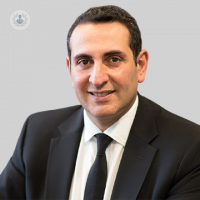10 Q&As you must consider when looking at managing your menopause
Escrito por:Although the menopause is viewed as a natural progression during a women’s journey in life, the symptoms can be debilitating and no woman should suffer in silence.
I’ll discuss what hormone therapy is on offer, what it does (or does not do), the alternatives, risks, benefits and how we (gynaecologists) help you decide which treatment is best for your menopause symptoms.

HRT (hormone replacement therapy) is one way to help you cope with the menopause and scientific research suggests that HRT is the most effective method. This means that the improvement of symptoms is likely to be quicker compared to alternatives. Having said that, you might find an alternative approach better suits your agenda.
1. What does HRT do?
HRT replaces and ‘tops up’ the lack of oestrogen in a women’s body during and after menopause. The hormones used in HRT are identical to the hormones that the ovaries produce during the time the ovaries were working, which is from the first period until menopause.
The hormones can be delivered in different forms:
- With an oral tablet
- With gel applied to the skin
- With a patch applied to the skin
- As a spray
- With a cream, tablet or ring applied to the vagina
This ‘best’ method will depend on each woman’s personal symptoms and preferences.
2. What are alternatives to HRT?
There are many alternatives to HRT, including non-hormonal options and bespoke treatments.
- Nutritional Supplements
- Cognitive [talking] therapies
- Plant-based oestrogen
- Some antidepressants
- Bespoke treatments for specific menopause symptoms e.g. vaginal dryness or pain during sex
- Several new non-oestrogen HRTs have come into the market
- Lifestyle adjustments e.g. diet, smoking, alcohol, exercise, weight control
If you need guidance on choosing from a long list of alternatives, contact a specialist. A personalised consultation with an expert is crucial for finding the best option for your personal needs.
3. Who should consider HRT?
Consider HRT if:
- Menopause symptoms trouble you any time from age 45 (which is technically the start of the menopausal phase).
- Menopause symptoms are affecting your performance [in the office, home or in bed] or quality of life.
To recommend HRT, we need to understand what each woman’s health priorities are. For example, if she has hot flushes and night sweats, she is likely to need systemic hormone therapy (meaning a tablet, patch, spray or gel) which essentially goes into her body’s system. But if the problem is dryness in the vagina and/or difficulty having sex, we can use a very local treatment in the form of either vaginal tablets, cream or pessaries, and these don’t have systemic effects (meaning they don’t affect the body as a whole but just work locally).
4. After starting HRT, do I stay on it forever?
Starting HRT does not commit women to using hormones forever. Some people believe that you must stop HRT after one or two years, but this is incorrect: there is no time limit for using HRT and some women choose to use HRT for many years. It depends on lifestyle and priorities.
Take a woman who enjoys skiing and wants to ski into her seventies. She might worry about her posture, agility and bones, during the menopause because the body produces less oestrogen. She may choose to continue using HRT for longer so that she can continue with a particular activity. The same applies to enjoying sex into a woman’s eighties or beyond.
Osteoporosis [brittle bones] is one consequence of lack of oestrogen and hormone therapy is preventative.
Nevertheless, the use of HRT needs to be reviewed, assessed and discussed every one to two years to make sure patients users don’t develop new risk factors for conditions like breast cancer or experience side effects.
With most women, I tend to say that it’s worthwhile trying HRT for 3-6 months to see if there is an improvement of symptoms or if there are side effects and then discuss a long-term plan. Some women say “It’s changed my life, I feel wonderful” whereas others might not notice a difference or have side effects that worry them. In these cases, we can look at alternative therapies. 6 months of hormone therapy does not materially amplify risks such as breast cancer.
5. How early can women start taking HRT for menopause symptoms?
It’s never too early to start HRT for menopause symptoms. The only requirement is that it should be started after a full discussion of the pros and cons.
6. What are the benefits of starting HRT early?
Evidence suggests that if a woman starts hormone therapy when she is at the start of her menopause, the benefits to her heart and arteries tend to be much more than if she starts HRT later on.
Around one per cent of the female population experience premature ovarian insufficiency. This is when a woman’s ovaries stop working under the age of 40. In such situations women must start HRT sooner rather than later, because a lack of oestrogen impacts many health factors e.g. the bones, the way the skin looks, heart disease and joint health. In short, HRT is needed to stem the tide of adverse changes before they become less reversible. Bones, heart and artery health, mental health and sexual responses suffer.
7. How late can women start HRT?
We also say that it’s never too late to start HRT. Having said that, we need to assess risk factors and priorities for women who are aged 60 and older. Alternatives may play a greater role in such situations
8. What are the risks of HRT?
There are three main risks to consider.
- Oestrogen makes the blood a bit stickier, so there is a risk of DVT (deep vein thrombosis). However, evidence suggests that the risks of DVT are lower when HRT is delivered through the skin.
- HRT does cause a slight increase in the risk of breast cancer. Women need to be aware of other risk factors such as age [we cannot do much about this!], However, life style, diet, alcohol, obesity and smoking all impact on the risk greater than Hormones.
- Some women can get nuisance side effects. This is not a risk in the sense of a disease, but it can cause intolerance to HRT. These side effects lessen with time which is why we recommend trying HRT for at least three months before passing a verdict.
9. Is it safe to have HRT and contraception at the same time?
The need for contraception continues as women transition through the menopause. Many contraceptives do not interfere with HRT e.g. example the intrauterine device (IUD) and progesterone-only pill (also called the ‘mini pill’).
If a woman is diagnosed as menopausal before the age of 50, she needs to continue with contraception for two years after diagnosis. If a woman is diagnosed with menopause after she turns 50, she needs to use contraception for one more year.
We do not recommend the use of the combined pill in women beyond the age of 50. The RCOG (Royal College of Obstetricians and Gynaecologists) has stated that it can be used safely up to the age of 50 and not beyond, and that the mini pill can be used after the age of 50.
10. How do gynaecologists guide women in the decision to have HRT?
In my practice, I look at each woman’s priorities. For example, a woman might have a cluster of symptoms, but only one is affecting her quality of life, so we decide to prioritise that one.
We evaluate each patient’s medical history to look for any past or existing physical and mental health conditions. We can then decide if hormone therapy or any other alternative would suit the health condition and if there is any reason that HRT may be harmful. For example, if a woman has breast cancer, we should look very carefully at alternatives to hormones.
I believe that there is a strong need to review the plan after a short time. Those who consider HRT should undergo a trial (3-6 months) and then assess if they want to carry on. Monitoring is also very important. We need to make sure that a woman understands that if she gets side effects or problems, alternatives are available.
Mr Ali Kubba is a leading expert in helping patients cope with and overcome conditions relating to gynaecology, sexual health and reproductive health. Learn how he can help you – visit his profile.


